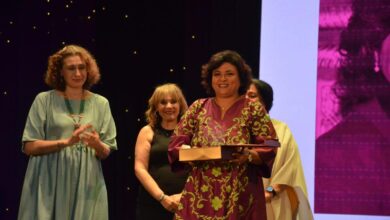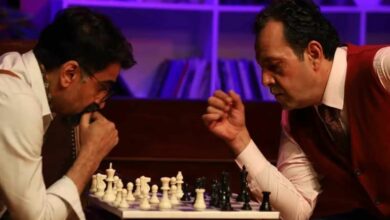On the opening night of “Lessons in Revolting”, Rawabet Theater was packed full, leaving many disappointed latecomers turned away at the door. The audience was eager to see the latest work by playwright Laila Soliman, which she co-directed and conceptualized with Ruud Gielens, in collaboration with a group of artists and performers.
This is Soliman’s second work since the 25 January revolution began. Her play “No Time for Art”, which took on the subject of human rights violations by the Egyptian military, was first performed in the Al-Fan Midan street art festival in May.
“Lessons in Revolting” takes on the recent history of the revolution through a unique collaborative process, where performers find ways to comment on experiences they had participating in protests and activism over the last six months. Described in the program notes as “a physical and visual political column,” the resulting work is an emotional tour through recent events and an emphatic promise by the performers to carry on the work of the revolution.
“Everyone was responsible to come up with scenes that were processed and made into collective scenes used to put together the final performance,” Gielens told Al-Masry Al-Youm. “We went through this process to create the content, and then we made the framework based on that content. Everyone individually was responsible for material.”
While “Lessons in Revolting” may not contribute unfamiliar images or perspectives, the audience gathered in Rawabet responded with enthusiasm to the play.
In one segment, actor Aly Sobhy delivered a monologue responding to statements from the Egyptian military that protesters should be happy they are not cracking down as violently as their counterparts in other Arab nations. While the overall tone of the monologue was angry, Sobhy’s humor drew repeated laughs from the audience.
In another scene, Salma Said spoke of feelings of abandonment in Tahrir Square when the military broke up protests there on 9 April. Said’s monologue was simple and heartfelt, expressing her wish for the safety and solidary felt on earlier nights in the square.
Singer Maryam Saleh’s performance of the song “Abd Al-Wadood” by Ahmed Fouad Negm and Sheikh Imam was a less direct response, but her exquisite, mournful delivery of a father’s letter to his son in the military was a highlight of the show.
The process of responding to experiences, rather than recreating memories, was an important distinction for Soliman.
“It is about reactions more than anything else, and using your experience to create something, to react, and to act,” she said. “Reacting to the story is about saying what you like or do not like about the story. Telling the story is just stating something. In this performance there is much more opinion.”
The overwhelming opinion expressed is anger at the ruling military council, and a sense that it is too early to celebrate a triumphant revolution.
The performers often appeared in footage featured throughout the show, emphasizing the fact that the actors themselves are involved activists. The self-reflective nature of the performance left the impression that the work was as much or more for the performers as for any outside viewer. The process of putting together scenes, moving through recent events, and compiling a collection of critical and emotional responses to the current state of the Egyptian revolution, is in part simply an opportunity for activists to process their experiences through creative means. The concept of lessons in the title can refer as much to the performers' learning experience through the creation of the performance, as to what the audience learns in viewing it.
After finishing its run in Cairo, the performers will take their production to Switzerland, the Netherlands and Germany. Soliman describes her play as a part of “active resistance,” a functional contribution to protest, and the function of a work that is such an immediate commentary on current events will be different abroad from its function in Egypt.
“In Egypt, I want to draw attention to situations people may not have been aware of, and I want to raise the issue of keeping the resistance going,” said Soliman.
But in taking the performance to Europe, she hopes the production will combat a media narrative that portrays the Egyptian revolution as peaceful and triumphant.
“The function outside of Egypt is to create an alternative narrative to media in the way they have portrayed events in Egypt,” says Soliman.
The performance ended with the performers walking through the audience and clanging together metal rods, followed by a vigorous and sustained dance of marching and chest-beating. As the performers collapsed, sweaty and exhausted from the final dance sequence, the audience rose to their feet in applause. The emotional impact of “Lessons in Revolting,” no matter who is in the audience, is undeniable.
“Lessons in Revolting” will be performed nightly at 9 pm until 23 August at Rawabet Theater, 3 Hussien al-Me'amar Street, off Mahmoud Basiouny Street
Tickets are available at the door, free of charge.




